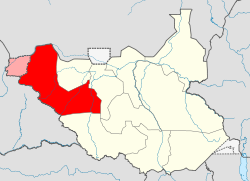Authorities in Western Bahr el Ghazal urge support for refugees
August 11, 2023 (JUBA) – The governor of South Sudan’s Western Bahr el Ghazal State, Sarah Cleto Rial has appealed for support for refugees fleeing the conflict in Sudan’s Darfur region, amid concerns over their dire situation.
In an interview on the state-owned television (SSBC) on Thursday, Rial said the ongoing conflict in Sudan has resulted into the massive influx of both Sudanese and South Sudanese refugees seeking refuge in Western Bahr el Ghazal State.
“Our people who went to Sudan are also returning. This has compounded the situation and this added a strain on local resources”, she explained.
The governor appealed to the local community to concentrate on economic activities especially agriculture since peace was now prevailing in the country.
“We are gaining peace, unity, and harmony in the state, but the state is facing challenges of an influx of returnees and refugees from Sudan due to the unrest in Sudan. That means all of us should concentrate on economic activities, especially in the agricultural sector, to enable us to build a society that is free of poverty and hunger and dependency,” she stressed.
The governor also outlined the state’s strategic plan, saying her government was mainly focusing on the governance, economic and the service delivery clusters.
“The main objective of establishing these clusters is to ensure proper coordination of all government programs at the state and all the government levels,” said Rial.
She further added, “Each of these clusters comprises of the related ministers.”
Western Bahr el Ghazal State shares a direct borders with South Darfur where violent conflict broke out in the wake of clashes that erupted in Sudan on April 15.
The conflict has forced South Sudanese who fled the country’s conflict in 2013 and 2016 to return home along with Sudanese seeking safety and security.
In recent months, however, humanitarian agencies and the office of the United Nations for he Coordination for Humanitarian Affairs (UNOCHA) have documented and expressed concerns that returnees and refugees from Sudan continue to experience barriers to their movement, including inflated bus fares insecurity along routes, risk of attacks, harassment and looting by armed groups.
Returnees are also experiencing food insecurity and serious health risks, with reports of some individuals, including children who die from health complications.
With over four million people displaced within Sudan and across neighbouring countries after sixteen weeks of conflict, the scale of the crisis has become staggering. More than 71 per cent of the internally displaced individuals fled from Khartoum state alone. Prior to the conflict, however, Sudan was already home to 1.1 million refugees, primarily from South Sudan, Eritrea and Ethiopia.
(ST)

